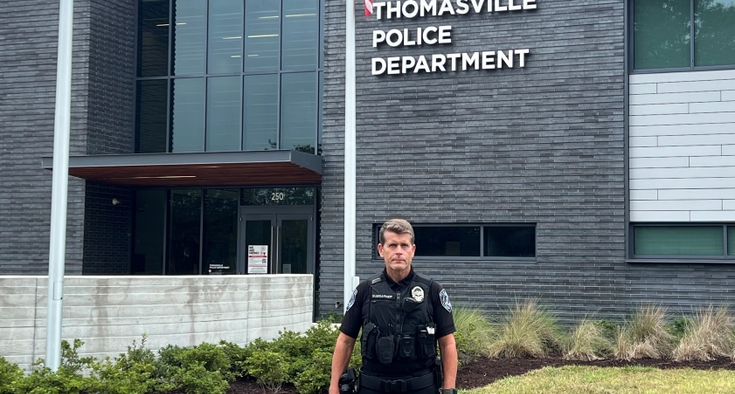Many teenagers who dream of becoming doctors eventually move on for one reason or another. But Dr. John Capelle? He knew he was ready when he helped stitch up his first patient at 16 while on a mission trip.
When a chance meeting with a U.S. surgeon in El Salvador presented the option to stay on another week to assist, Capelle called his parents and headmaster for permission.
Barely old enough to drive, Capelle assisted the suturing of a child whose fingers required separation to regain dexterity. Capelle himself was a kindergartener when he received his first toy medical kit as a gift. Now, he was wearing scrubs and gloves and it was more real than he could have imagined.
“I pretty much fell in love with orthopedics at that point,” Capelle said. “I was looking for a universal skill that I could use wherever I went. I realized that I could restore function to someone, and with my own hands.”
Capelle comes from a large family of mostly engineers. But at 16, he had an actual doctor’s kit to call his own. That gift from the surgeon in Central America would serve as much more than just a souvenir back home.
A hands-on education
The expedition was half a lifetime ago. Now 34, Capelle brings his hand and upper-extremity surgery expertise to Novant Health Sports Medicine and Orthopedics - Brunswick, where he started in September 2023.
Over the summer Capelle relocated with his wife and their young son from Florida to Oak Island, North Carolina, where Capelle still feeds his lifelong obsession with sailing, fishing, and scuba-diving in the Atlantic.
It’s not his first time in the Carolinas. Capelle was born in Texas but his family settled in Greenville, South Carolina when he was in middle school. After that fateful mission trip, he went on to study biology at the College of Charleston, and in 2016 graduated from the Medical University of South Carolina. A six-year residency at the St. Louis University School of Medicine followed.
As a hand-surgery fellow at the University of Miami and Jackson Memorial Hospital, Capelle treated virtually every sort of traumatic injury: pickleball slips, gunshot wounds, shark and barracuda bites. There were chefs with sliced hands, and mechanics with crushed fingers. There were mango farmers who survived nasty, territorial fights involving machetes, thanks to Capelle. That year in Florida was an education in just how far people can go to jeopardize their own fingers and hands.
Capelle had had his own brush with trauma back in college. While diving in Honduras with friends, Capelle speared a venomous lionfish – which promptly stabbed him back.
“I thought I was going to lose my index finger; it was excruciating pain,” he said. “I had a greater appreciation for hand and finger injuries after that.”
The night the teenaged Capelle returned from El Salvador, he seized the moment to demonstrate what he had learned. After a celebratory family dinner, Capelle grabbed the surgical instruments he had just acquired. There at the kitchen table, in front of his family, Capelle dissected what was left of the chicken. It wasn’t quite surgery, but the impromptu procedure went down as one of the most memorable dinner conversations ever at the Capelle house.
Treating carpal tunnel and more
Of course, most hand injuries Capelle sees don’t involve lionfish or machetes. One of the most common conditions he treats is carpal tunnel syndrome.
It can cause the hand to tingle or fall asleep. The condition is common; those with diabetes or who are pregnant are among the many people who develop it.
Capelle specializes in the minimally invasive endoscopic carpal tunnel surgery; the joint pain and deformity that accompanies rheumatoid arthritis; the locking sensation of trigger finger; hand and wrist fractures; and Dupuytren’s contracture, which is characterized by a thickening palm and the involuntary curling of the fingers.
But is hand surgery always necessary? Not if you see a specialist as soon as possible, Capelle said. An early diagnosis can reveal more about what’s going on, and inform an early aggressive treatment plan.
“I wish people would see a specialist sooner so that whatever problem they have doesn’t deteriorate to the point where we can’t make them better,” Capelle said. “We always try to exhaust all non-operative treatments that we can, and we provide education on how to successfully improve their symptoms without surgery.”
If people with carpal tunnel are not treated early on the nerve can become compressed, which guarantees a tougher recovery. Otherwise, if addressed right away, surgery can mean improvement overnight for some, Capelle said.
What Capelle loves most about orthopedics is that many patients will be much improved within three months, depending on the extent of the injury. He also loves that orthopedic patients are motivated to get better. His love for administering that treatment hasn’t wavered since his first experience in El Salvador.
“I continue to want to fulfill that passion and do the best I can at it,” Capelle said. “It’s what I feel like I was called to do.”









